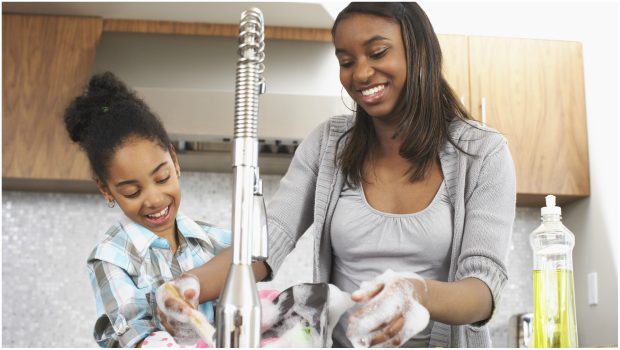
Prevention is better than cure, it’s said. A 2014 survey by the Global Hygiene Council of more than 16 000 adults across 16 countries showed that when it comes to the spread of infections and diseases, 83 % of people think of their homes as a low-risk zone.
Yet, bacteria like E. coli and salmonella, which cause diarrhoea and vomiting, can be spread in your home and office and cause unwanted illness.
Washing your hands thoroughly and regularly with soap and clean water is a very simple method to protect yourself and your family from preventable infections. Yet, how often do people use the toilet at work and not wash their hands afterwards?
Here are handy tips from the book 1000+ Hints for the Home by Solet Scheeres (R250, Human & Rousseau) to keep your house spick and span, and to avoid potential contamination:
In The Kitchen
- To reduce the risk of contamination and potential food poisoning, use two chopping boards – one for meat and chicken and another for fruit and vegetables. Clean and disinfect the cutting boards regularly. To clean a dirty wooden board properly, rub salt across the surface using half a lemon. Rinse, then rub olive oil into the wood. S A sponge is the household item that harbours the most germs. Wash sponges and kitchen cloths with hot water.
- Food containing milk products will deteriorate more quickly. As a rule, once you’ve eaten, don’t leave food standing out for hours. Put it in the fridge once it has cooled off.
- Dry salad can be kept at room temperature, but anything containing a dressing must be put in the fridge.
- To clean your drains, pour 250 ml (1 cup) of bicarbonate of soda down the plug hole, then slowly add a cup of vinegar. Follow with boiling water.
- To clean your microwave, place 30 ml (2 tablespoons) of lemon juice and 500 ml (2 cups) of water in a bowl and cook on high for approximately three minutes. Remove the bowl and wipe down the inside of the microwave using a paper towel.
- If you have an old fridge that doesn’t defrost automatically, apply glycerine to the sides to stop ice building up.
- Clean preparation areas with hot, soapy water before and after working with raw food, especially chicken, fish, meat and eggs.
- Stained kitchen towels contain bacteria so you should change them every week. Wash them separately from your clothes or soak them overnight in a bowl of bleach and water.
In The Bedroom
- For a fresh-smelling mattress, sprinkle bicarbonate of soda on it and leave it for 30 minutes, then vacuum up the bicarbonate.
- Remove urine stains from a mattress using a foam carpet cleaner. For stubborn stains, you can use upholstery stain remover or white vinegar diluted with water.
- Sprinkle borax behind cupboards and large appliances to keep silverfish (fish moths) away. WARNING: Borax is poisonous so make sure children and pets are not able to reach it. Epsom salts, lavender, camphor, cloves and rosemary will also deter silverfish from moving in. While silverfish are not harmful to humans, they destroy your clothes and anything made of paper. In your kitchen, they feed on cereal, vegetables, sugar and flour. Mothballs are made of naphthalene, which smells terrible and is poisonous but when stored in garments they keep away clothes moths.
- Iron clothes with a steam iron to get rid of moth larvae.
- Change your bed linen every one or two weeks, especially during summer months. Wash curtains twice a year as they trap dust. If you have allergies, wash them quarterly.
In The Bathroom
- Do not share facecloths. In a damp state they are breeding grounds for bacteria and mould that can cause irritation and infection.
- If you wash and dry the bath or basin every time you use it, you won’t have to face cleaning heavy soiling or lime scale deposits.
- Change your hand towels frequently to prevent the transfer of germs from one person to another.
- Do not share hand and bath towels if one member of the family has a potentially contagious skin condition.
Wash Your Hands
Dr Kgosi Letlape, a Joburg-based doctor and member of the Global Hygiene Council, says faecal contamination is easily spread from one surface to another. “It’s a good habit to take time to wash your hands thoroughly and to make sure you wash between the webs of the fingers, the base of your thumb, your nails, palms and wrists,” he advises. Washing your hands should be a daily routine that is repeated often. It is especially important to do so before and after preparing food, after coughing or sneezing (to prevent the spread of infections), before you eat and when they look dirty, of course.


















